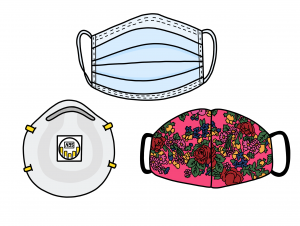Quick Facts for COVID-19
- In the respiratory tract lining, COVID-19 infects the cells and has been labelled a respiratory virus.
- The virus can be spread by droplets through coughing, sneezing, talking, laughing, etc.
- Droplets also settle on surfaces all around us and this virus can survive on surfaces from hours to days. Frequent sanitization of commonly touched surfaces is recommended.
- People are generally infectious for many days, that is why it is recommended that individuals self-isolate for at least ten days, or until symptoms have gone away (whichever is longer) if they are sick.
What is COVID-19?
COVID-19 is a respiratory virus that infects the cells of the lining of the respiratory tract, pharynx, and throat. It is invisible to the human eye, but very dangerous, causing many people to become very sick and need to visit the hospital, and in some cases, pass away. Seniors and people with underlying medical conditions like heart disease, lung disease, and diabetes are at higher risk of becoming very sick, so it’s especially important that we work together to protect these people.
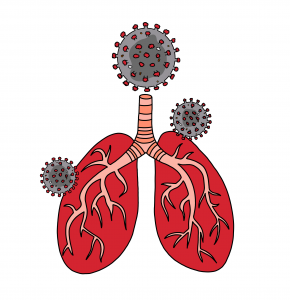
Common Symptoms Include:
- Fever
- Cough
- Sore Throat
- Fatigue
- Runny Nose
- Shortness of breath
Symptoms May Also Include:
- Headaches
- Weakness
- Muscle/joint aches
- Nausea
- Loss of appetite
- Altered smell or taste
Most people have mild symptoms and can recover at home.
How is COVID-19 Spread?
COVID-19 can travel from one person to another person through the droplets in their breath, speech, coughs, and sneezes, and it is very contagious. When a person infected with COVID-19 breathes, speaks, coughs, or sneezes, droplets that contain the virus fall down and settle on surfaces around them. And when that person touches their nose or mouth maybe coughs into their hands or wipes their nose or mouth the sickness is now on their hands until they wash them really well with soap and water, and can be spread to anything they touch, like door handles, countertops, light switches, etc. The virus can survive for hours and even days on those surfaces if they’re not cleaned and disinfected.
How does the disease enter your body?
-
- Being coughed on directly
- Close contact with an infected person
- Touching any surface that has droplets on them, and then touching your eyes, nose, or mouth.
When individuals are sick, even with mild symptoms, it is important for them to stay home and self-isolate:
-
- Stay away from other people.
- Don’t go out, ask others to bring your supplies, or medications.
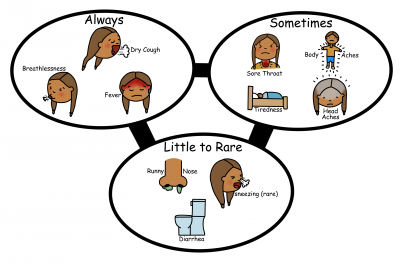
- Wash your hand frequently with soap and water.
- Cover your cough or cough into your sleeve.
Siksika Health Services and Siksika Nation Administration are doing their best to support individuals and households to self-isolate within their own home. This includes support for food and essential supplies, medications and access to mental health and essential services. However, some ill individuals may not be able to isolate safely at home, or their household may not have the resources or space for isolation.
Siksika has developed compassionate isolation options for those who cannot isolate safely at home. If this is something you believe that you or someone in your household requires or may benefit from, be sure to tell the Community Health nurse when they call, following your COVID-19 test.
If you feel unwell or have any new or change in symptoms, Home COVID-19 rapid testing can help identify and prevent spread of COVID-19. Rapid test kits are available for Siksika Nation members free-of-charge at locations across Siksika:
- Siksika Health & Wellness Centre between 9:00am-4:00pm, Monday-Friday (closed from 12:00-1:00pm for lunch)
- M&R (Boy Chief Trading Post)
- Petro-Canada
- Siksika Trail Market
COVID PCR testing will be available, as required, at the Siksika Health & Wellness Centre between 9:00am-4:00pm, Monday-Friday (closed from 12:00-1:00pm for lunch).
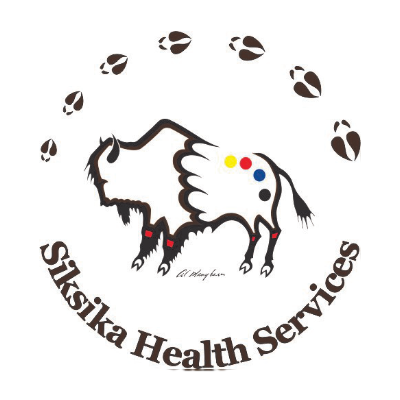
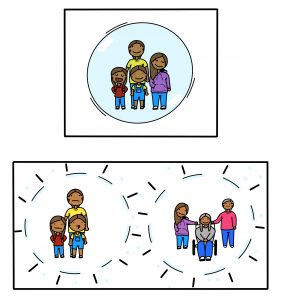 Keep distance from other people: wear a mask whenever you are indoors in common areas or shared spaces with people outside your household. This COVID-19 virus can travel in the droplets from a sick persons breath, speech, coughs or sneezes, so if you are within 2 metres of another person and they speak or breathe, or happen to cough or sneeze, the droplets containing COVID-19 virus could reach you, and also make you sick. People infected with COVID-19 do not always have noticeable symptoms, and it can take a few days for symptoms to develop once a person does become infected. What this means is that if you are within 2 metres of another person, you can catch COVID-19 from them.
Keep distance from other people: wear a mask whenever you are indoors in common areas or shared spaces with people outside your household. This COVID-19 virus can travel in the droplets from a sick persons breath, speech, coughs or sneezes, so if you are within 2 metres of another person and they speak or breathe, or happen to cough or sneeze, the droplets containing COVID-19 virus could reach you, and also make you sick. People infected with COVID-19 do not always have noticeable symptoms, and it can take a few days for symptoms to develop once a person does become infected. What this means is that if you are within 2 metres of another person, you can catch COVID-19 from them.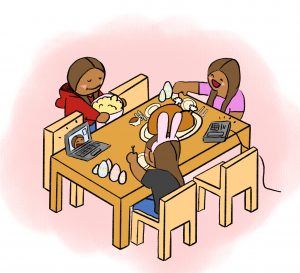 But just because we need to stay physically distant from one another doesn’t mean that we need to be socially disconnected! There are plenty of ways to stay in touch with family and friends, and even make new friends at this time: call, text, or video message other people, or call the support line at 403-734-5660 to talk to a Mental Health Therapist. Being alone can add fear to feelings of loneliness, anxiety and depression. Talk to check on and remain connected to your children, family, and friends.
But just because we need to stay physically distant from one another doesn’t mean that we need to be socially disconnected! There are plenty of ways to stay in touch with family and friends, and even make new friends at this time: call, text, or video message other people, or call the support line at 403-734-5660 to talk to a Mental Health Therapist. Being alone can add fear to feelings of loneliness, anxiety and depression. Talk to check on and remain connected to your children, family, and friends.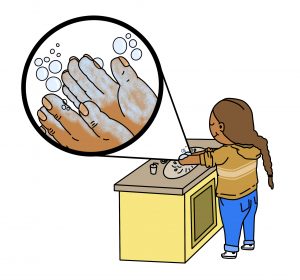 door handles, cellphones, light switches, etc. If you’ve touched any surfaces that have COVID-19 droplets on them, the virus might be on your hands now, and then if you touch your nose, eyes, or mouth you could become infected with the virus as well. When it comes to washing your hands, just regular soap and water is best (don’t worry about buying the best antibacterial soap or COVID-19 soap). Sing your favourite powwow or country/western song while washing your hands to be sure you’re washing long enough – 20-30 seconds is the length of time it takes to get your hands clean.
door handles, cellphones, light switches, etc. If you’ve touched any surfaces that have COVID-19 droplets on them, the virus might be on your hands now, and then if you touch your nose, eyes, or mouth you could become infected with the virus as well. When it comes to washing your hands, just regular soap and water is best (don’t worry about buying the best antibacterial soap or COVID-19 soap). Sing your favourite powwow or country/western song while washing your hands to be sure you’re washing long enough – 20-30 seconds is the length of time it takes to get your hands clean.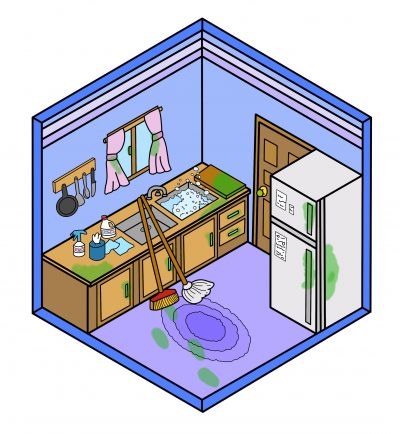 Cleaning and disinfecting the house can be a pain-in-the-butt, but its important for getting rid of any virus droplets that may have fallen on surfaces like countertops, tables, door handles, light switches and cleaning can be a great workout too! Try turning on the radio to 104.7FM – The Nation’s Station – or putting on some music that makes you smile, and make that cleaning/disinfecting happen! Any cleaning product labelled “Disinfectant” will do the job, and if you cant find any, a solution of 1 part bleach to 9 parts water will work just as well. (don’t forget to wear rubber gloves when disinfecting – especially if you’re using bleach!)
Cleaning and disinfecting the house can be a pain-in-the-butt, but its important for getting rid of any virus droplets that may have fallen on surfaces like countertops, tables, door handles, light switches and cleaning can be a great workout too! Try turning on the radio to 104.7FM – The Nation’s Station – or putting on some music that makes you smile, and make that cleaning/disinfecting happen! Any cleaning product labelled “Disinfectant” will do the job, and if you cant find any, a solution of 1 part bleach to 9 parts water will work just as well. (don’t forget to wear rubber gloves when disinfecting – especially if you’re using bleach!)